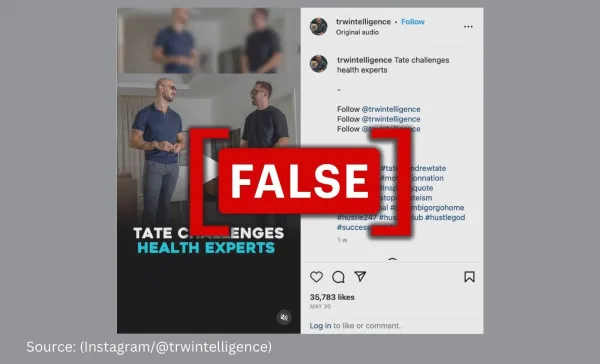By: Nikolaj Kristensen
June 12 2023

Andrew Tate’s statements downplay the risks and addictiveness of nicotine.
Context
In a video titled “Tate challenges health experts,” British-American social media influencer Andrew Tate is seen smoking cigars while saying, “Caffeine is beautiful, as is nicotine, ingest as much as possible, and for any doctor who says that it’s unhealthy, meet me in the cage and we’ll talk about health.”
Tate originally made the statement on fellow influencer Ahmad Mahmood’s YouTube show on November 12, 2022. On the show, he praised the effects of both nicotine and caffeine. However, Tate’s statements downplay the health risks and addictiveness of nicotine.
In Fact
“Nicotine is extremely addictive,” warns Jesper Andreasen, associate professor in Translational Pharmacology at the University of Copenhagen, who specializes in the effects of nicotine. “Addiction in general is related to a shift in focus and priorities and to stress, anxiety, and depression when one is removed from one's drug.”
Andreasen explains that there’s a huge difference between how nicotine affects the brains of the young and the old. Aside from addiction, nicotine itself does not pose as much of a health risk to people older than 25, when the brain is fully developed, he says. “From the age of 12 to 19, as part of its natural development, the brain eliminates half of its synapses, keeping and strengthening those used the most. Using fast-acting drugs at this stage will lead the brain to prioritize fast rewards throughout one’s life,” explains Andreasen. Nicotine is considered a fast-acting drug, as inhaled nicotine reaches the brain in 5-15 seconds.
Andreasen points to studies that show people who started smoking cigarettes before the age of 13 are 80 times more likely to develop a drug addiction later in life. “Other factors play into this, but even adjusting for those leaves a considerably increased risk of becoming addicted for example to alcohol, heroin, cocaine, or, of course, nicotine,” he says.
While the long-term health effects of nicotine in isolation is a matter of scientific debate, nicotine mostly enters the body through tobacco smoking, such as cigars, favored by Tate. Tobacco is well-known to greatly increase the risk of cancer, heart disease, and other illnesses.
Tate’s praise of coffee is less problematic. Caffeine can be beneficial to performance, but it is not a case of more always being better, explains Neil Clarke, associate professor researching nutritional ergogenic aids at Coventry University’s Research Centre for Sport, Exercise and Life Sciences.
“Some of the most reported side-effects in the literature are increased heart rate and palpitations, anxiety, headaches, as well as insomnia and hindered sleep quality. Caffeine ingestion can also include gastrointestinal distress and increased ratings of nervousness, all of which might limit its efficacy to enhance performance,” says Clarke, explaining that the more caffeine consumed, the more severe the side effects.
The European Food Safety Authority has concluded that “habitual caffeine consumption up to 400 mg per day does not give rise to safety concerns for non-pregnant adults.” The U.S. Food and Drug Administration estimates that toxic effects, like seizures, can be observed with rapid consumption of around 1,200 mg of caffeine.
The Verdict
Nicotine is extremely addictive and seriously affects the brains of young people, making them more likely to become addicted to other drugs later in life. It is often consumed through tobacco products, which are known to greatly increase the risk of cancer, heart disease, and other illnesses. Caffeine can be beneficial to performance but is associated with several side effects, depending on dosage. Therefore, we have marked this claim as false.